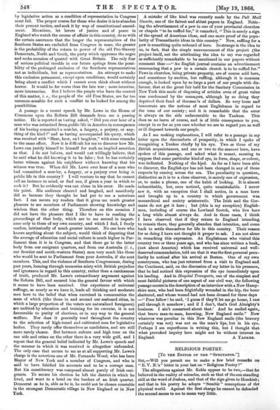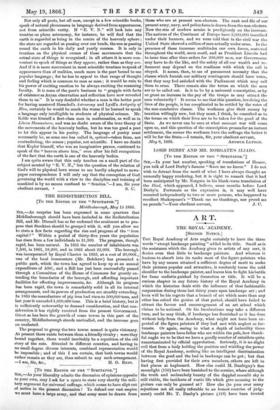RELIGIOUS POETRY.
[To THE EDITOR OF THE "SPECTATOR.") Si,—Will you permit me to make a few brief remarks on " E. V. N.'s" letter in your last on "Religious Poetry?"
The allegations against Mr. Keble appear to be two,—that he believed in the reality of miracles, such as that of the sun standing still at the word of Joshua, and that of the sign given to Hezekiah; and that in his poetry he adopts "Semitic" conceptions of the physical world. Against the first charge he cannot be defended the second seems to me to mean very little.
Not only all poets, but all men, except in a few scientific books, speak of natural phenomena in language derived from appearances, not from scientific verity. If "E. V. N." will look into any treatise on plane astronomy, for instance, he will find that the earth is regarded as being in the centre of the heavenly sphere ; the stars are regarded as passing over our heads, the sun as passing round the earth in his daily and yearly courses. It is only in treatises on the physical causes of these movements that the actual state of things is recognized ; in all others it is more con- venient to speak of things as they appear, rather than as they are. And if it is more convenient in most scientific treatises to speak of appearances than of realities, much more is the poet bound to use popular language ; for he has to appeal to that range of thought and feeling which is common to man as man ; it would be ruin to his power of exciting emotion to be always exciting the reasoning faculty. It is none of the poet's business to "grapple with facts of existence as Aryan observation and reflection have now revealed them to us." It is very doubtful whether a man is the better poet for having mastered Herschel's Astronomy and Lyell's Antiquity of Man, certainly he would be much the worse if he learned to speak a language only intelligible to students of physical science. Mr. Keble was himself a first-class man in mathematics, as well as in Literm Human iores, and was no doubt aware of the true theory of the movements of the heavenly bodies, but he was too good a poet to let this appear in his poetry. The language of poetry must necessarily be, as some one has called it, optical—taken from, not contradicting, the senses ; popular, not scientific. I have no doubt that Kepler himself, who was an imaginative person, continued to speak of the "heaven above him," even after his full recognition of the fact that the earth is one of the heavenly bodies.
I am quite aware that this only touches on a small part of the subject mooted by "E. V. N.," but the question of the relation of God's will to physical laws seems to me hardly adapted to news- paper correspondence I will only say that the conception of God governing the world with a view to the discipline and training of mankind is by no means confined to " Semites."—I am, Sir your































 Previous page
Previous page